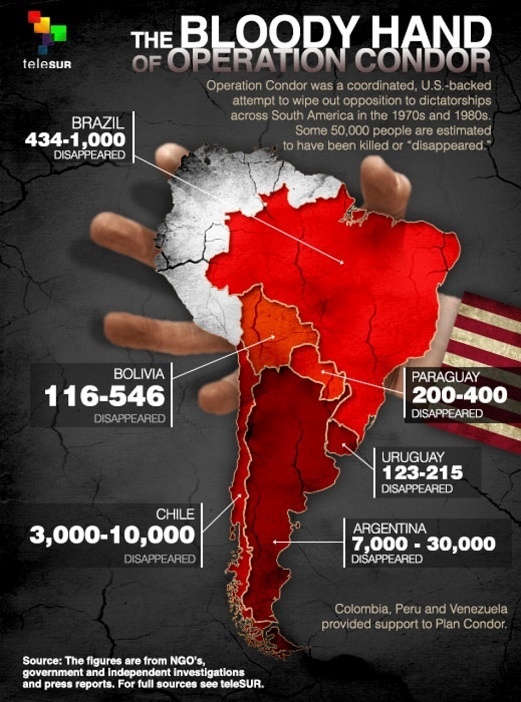|
Docs Show US
Wanted to Rig Election in Ecuador to Prevent Left-Wing
Victory
By teleSUR
December 17,
2016 "Information
Clearing House"
- "teleSur"
-
While leftist Jaime Roldos Aguilera went on to become
Ecuador's president, he was later killed in a plane
crash under mysterious circumstances.
Previously
classified documents released earlier this week on
Operation Condor have shed further light on how the U.S.
controlled and meddled in Latin America politics in the
1970s, showing how the U.S. was tossing up the idea of
“tinkering” with the outcome of elections in Ecuador as
the victory of a left-wing president appeared likely.
The latest release of the Cold War-era
documents detailed intelligence from July 24, 1978,
where the U.S. Defense Intelligence Agency looked into
committing fraud in Ecuador’s 1979 election after
left-wing candidate Jaime Roldos Aguilera won the most
votes in 1978 but not enough to avoid a second runoff
election scheduled for April 1979.
According to the source, embassy reports
showed that Ecuador’s navy and president at the time,
Alfredo Poveda, who came to power in a military coup,
were “determined to have a clean election.”
Ecuador’s military was also “determined to allow Roldos
to participate in a runoff election,” according to
reports from the Embassy and DIA.
In the runoff election, Roldos would be
pitted against Sixto Duran Ballen, from the right-wing
Social Christian Party. In the first round of elections,
Raul Clemente Huerta, from the centrist Radical Liberal
Party, received the third most votes.
Showing Washington's clear disdain for
left-wing candidates, the intelligence report states
that “a DIA summary sees some possibility of tinkering
the outcome for the second slot in the run-off since
Huerta would have a better chance of defeating Roldas
than the current apparent second place candidate Duran.”
Yet Roldos won the runoff election and
become president in August 1979, the country’s first
freely elected president without a background in the
military. His campaign was built on a populist platform
on human rights and labor reforms. During his tenure he
brought in a number of important labor measures such as
increasing the minimum wage and capping the country’s
workweek to 40 hours.
He was well known for his advocacy of
human rights around Latin America and pushed other
Andean countries develop a charter of universal rights
built on social justice and in particular
non-intervention - something that did not sit well with
the U.S. amid the fear of communism spreading during the
cold war.
Roldos also supported a number of
left-wing movements around the region, again ruffling
feathers within Washington. Roldos also declined Ronald
Reagan’s presidential inauguration in 1981.
Roldos died in a plane crash in May 1981,
which created accusations that it was a part of a
U.S.-backed assassination. Panama President Omar
Torrijos, who also was critical of the U.S. role in the
region and was known for his human rights leadership,
died two months later in a plane crash, raising similar
accusations.
After a CIA document was released in
2014, revealing that Ecuador was a part of Operation
Condor, Ecuador’s attorney general’s office opened an
investigation into his death.
“With this information, we are going to
examine information of whether the accident which killed
President Roldos was in fact an accident or was not an
accident,” said Attorney General Galo Chiriboga told
media after the investigation was launched. As of yet,
there has been no official answer surronding the
possible U.S. role in his death.
The 2014 document
states that Ecuador became part of Operation Condor in
1978, joining dictatorships of Argentina, Bolivia,
Brazil, Chile, Paraguay and Uruguay. Ecuador's
intelligence services and its armed forces agreed to
share information with other countries and to take part
in surveillance and psychological warfare, according to
files.

The views
expressed in this article are the author's own and do
not necessarily reflect Information Clearing House
editorial policy. |